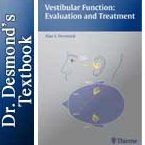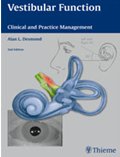Treating Dizziness with Antivert
Research indicates that long-term use may not be the best solution
By Alan L. Desmond, Au.D., CCC-A and R. Brian Collie, D.O., R.Ph.
Considering how frequently Antivert is prescribed for dizziness, its effectiveness has been measured in remarkably few studies. While there is general agreement among specialists that vestibular compensation is inhibited by the use of vestibular or central nervous system sedative medications,1 the literature suggests that these types of medications are used the majority of the time when a patient presents in the primary care setting with the complaint of dizziness, vertigo or imbalance. Well over half of these patients – 61 percent to 89 percent – receive some type of medication following their initial visit, Antivert being the most common.2 3
In one study, approximately 90 percent of patients subsequently diagnosed with benign paroxysmal positional vertigo (BPPV) were given Antivert prior to receiving a correct diagnosis.4 However, another study found that in the general population only 31 percent of patients receiving medication for dizziness found it helpful.5
Dizziness is a vague term that can mean different things to different people. A recent study reports that of elderly patients complaining of dizziness, only 25 percent were describing rotary vertigo.6 On further questioning, approximately 75 percent described their dizziness as unsteadiness, disequilibrium, loss of balance, or pre-syncopal lightheadedness. Although etiology of these complaints was not obtained, we know that BPPV is the most common cause of vertigo, and disequilibrium and unsteadiness can be the result of vestibular and/or non-vestibular pathology.
Antivert (meclizine hydrochloride) is an antihistamine. According to the Physicians’ Desk Reference, it is effective for “management of vertigo associated with diseases affecting the vestibular system.”7 Antivert is not recommended for complaints of unsteadiness, disequilibrium, loss of balance, or pre-syncopal lightheadedness.
Medication taken to suppress vestibular symptoms ideally should be used only during the acute stage following vestibular insult. During the acute phase of vestibular dysfunction, typically lasting three to five days, vestibular suppressants are helpful in reducing the activity in the vestibular nuclei and cerebellum. Tonic asymmetry in activity in these areas creates the acute symptoms of vestibular-induced vertigo. In order for natural or therapeutically enhanced compensation to take place, the brain eventually must be made aware that an asymmetry exists. Appropriate treatment following the acute phase encourages activity to promote central compensation rather than suppression of stimulation needed for compensation.
The intensity of vertigo associated with BPPV may be lessened when using Antivert. However, this is a less than ideal treatment for two reasons: a therapeutic dosage of Antivert creates a lasting sedating effect only to marginally reduce the intensity of symptoms, which last only a few seconds, and Canalith repositioning procedures are extremely effective in relieving the symptoms of positional vertigo.
Many patients describing dizziness do not experience vertigo and may have perfectly normal vestibular function. However, since suppressant medications may hinder the function of the vestibular apparatus at a time when the patient is most dependent upon it, these patients actually may experience greater symptoms.
In 1972 a randomized, double-blind crossover study indicated that meclizine had a greater effect than a placebo on diminishing symptoms and signs of vertigo of vestibular origin.8 Scopolamine has been shown to be more effective than meclizine in treating the symptoms of motion sickness.9 We are aware of no studies that indicate meclizine provides any benefit for complaints of disequilibrium, imbalance or lightheadedness.
Negative Effects
Kennedy et al. performed psychomotor tests and questionnaires on healthy young adults after administering therapeutic doses of several different medications used for motion sickness, including meclizine and hyoscine (scopolamine).10 While their results showed no major decrease in several psychomotor tests, they did indicate that meclizine had a significant detrimental effect on balance tests involving standing on a balance beam. A possible caveat to this study is the fact that the tests were performed within one to two hours of drug ingestion, while later studies showed that meclizine had its peak central nervous system effect nine hours after dosing.11
Manning et al. explored the central nervous system effects of meclizine and dimenhydrate (Dramamine). Their results “demonstrate that both dimenhydrate and meclizine, in recommended doses, produce drowsiness and impaired mental performance greater than placebo.” These authors attempt to “interpret the meaning of the observed decrement in test scores” by comparing their results to the effects of ethanol (alcohol): “Ethanol serves as a unique drug to reference degree of impairment because there are epidemiologic data that relate to blood alcohol concentrations with a known risk (.07) percent) for being involved in a traffic accident.” Comparison of the data demonstrates that the effect of dimenhydrate and meclizine on mental reaction time is equal to that observed while blood alcohol levels were .04 percent or .06 percent.
Postural Control
Two recent studies demonstrate the efficacy of vestibular therapy vs. medication in improving postural control in patients with vestibular deficiency. Horak et al. compared “relative effectiveness of vestibular rehabilitation, general conditioning exercises and vestibular suppressant medication” on subjective dizziness and postural control.12
The medication group was treated with Valium or meclizine, both centrally sedating medications. Over a six-week treatment period, all groups reported a reduction in symptoms, but only the vestibular rehabilitation group showed significant objective improvement in scores obtained from posturography and standing balance tests.
The use of centrally sedating medication may impede the benefits of vestibular rehabilitation therapy.
Shepard et al. reported that patients taking vestibular suppressants, antidepressants, tranquilizers and anticonvulsants, antidepressants, tranquilizers and anticonvulsants ultimately achieved the same level of compensation as patients not taking similar medications, but the length of therapy was significantly longer.13
Antivert is helpful for vertigo associated with sudden acute vestibular asymmetry due to Meniere’s disease or vestibular neuritis but should be withdrawn once the acute symptoms have diminished. It is not recommended for complaints of unsteadiness, loss of balance, and disequilibrium, whether of vestibular origin or not. Vertigo related to BPPV is better treated through Canalith repositioning techniques.
Long-term use of Antivert is inappropriate, and the drug may be overprescribed in the primary care setting.
References
- Zee, D. (1985). Perspectives on the pharmacotherapy of vertigo. Archives of Otolaryngology, 111: 609-612.
- Sloane, P. (1989). Dizziness in primary care. Results from the national ambulatory care survey. Journal of Family Practice, 29 (1): 33-38.
- Burke, M. (1995). Dizziness in the elderly; etiology and treatment. Nurse Practitioner, 20 (12): 28-35.
- Li, J., Li, C., Epley, J. & Wienberg, L. (2000). Cost effective management of benign positional vertigo using Canalith repositioning. Otolaryngology-Head and Neck Surgery.
- Kroenke, K., Arrington, M. & Mangelsdorff, A. (1990). The prevalence of symptoms in medical outpatients and the adequacy of therapy. Archives of Internal Medicine, 150: 1685-1689.
- Tinetti, M., Williams, C. & Gill, T. (2000). Dizziness among older adults: A possible geriatric syndrome. Annals of Internal Medicine, 132 (5): 337-344.
- Physicians’ Desk Reference. (1999). 53rd edition, Montvale: Medical Economics Company Inc.
- Cohen, B. & Vianney, deJong J. (1972). Meclizine and placebo in treating vertigo of vestibular origin. Archives of Neurology, 27: 129-135.
- Dahl, E. et al. (1984). Transdermal scopolamine, oral meclizine, and placebo in motion sickness. Clinical Pharmacology and Therapeutics, 36 (1): 116-120.
- Kennedy, R., Wood, C., Graybiel, A. & McDonough, R. (1966). Side effects of some antimotion sickness drugs as measured by psychomotor test and questionnaires. Aerospace Medicine, 408-411.
- Manning, C., Scandale, L., Manning, E. & Gengo, F. (1992). Central nervous system effects of meclizine and dimenhydrinate: Evidence of acute tolerance to antihistamines. Journal of Clinical Pharmacology, 32: 996-1002.
- Horak, F., Jones-Rycewicz, C. Black, F. & Shumway-Cook, A. (1992). Effects of vestibular rehabilitation on dizziness and imbalance. Otolaryngology-Head and Neck Surgery, 106: 175-180.
- Shepard, N., Telian, S. & Smith-Wheelock, M. (1990). Habituation and balance retraining therapy: A retrospective review. Neurologic Clinics, 8(2): 459-475.



